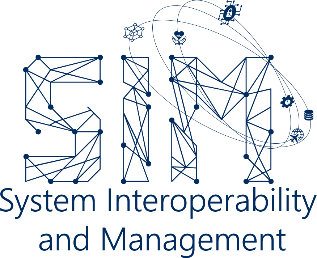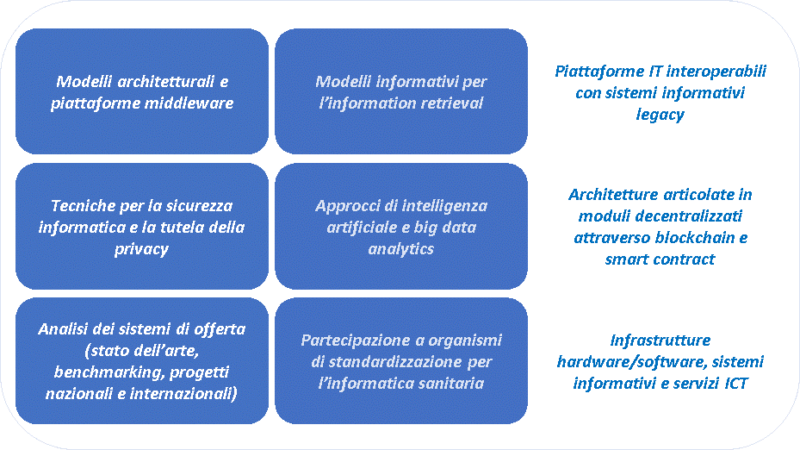
Activity Description
 |
The group carries out applied research and technological development activities aimed at designing and implementing technological platforms, techniques and application services to make heterogeneous IT systems interoperable with each other, even on a large scale. By integrating the different approaches of Information Management, Data Interoperability, Machine Learning, and Cybersecurity, the group provides solutions that facilitate the search, accessibility, interoperability, and reuse of data present in distributed information systems, in accordance with the FAIR (Findable, Accessible, Interoperable, Reusable) principles. |

The main activities carried out by the group are:
- Design, implementation, and verification of architectural models and middleware platforms, also based on cloud computing.
- Definition of information models for the homogeneous representation of data from multiple sources, to support information retrieval.
- Modeling of business processes for the coherent development of IT platforms interoperable with legacy information systems.
- Definition and application of techniques for IT security and privacy protection.
- Application and implementation of techniques based on artificial intelligence and big data analytics approaches for the extraction, analysis, and classification of information.
- Definition of architectures structured in decentralized modules for the tracking and certification of events using blockchain technology and smart contracts.
- Analysis and understanding of supply systems in terms of innovative products and services (state of the art, benchmarking, national and international projects).
- Contribution to the issuing of standards and technical regulations in the healthcare IT sector through participation in standardization bodies.
- Management and maintenance of hardware/software infrastructures, information systems and ICT services.
Particular attention is paid to the development of interoperability models for healthcare information systems on a national scale compatible with European ones, through cooperation with the competent Institutions, with particular reference to the Electronic Health Record.
Objectives
The group aims to promote the adoption and development of new ICT products, processes, and services through the definition, management, and validation of interoperable technological solutions that facilitate the collection, management, and understanding of digital data of different nature, respecting the requirements of cybersecurity and privacy.
In particular, interoperability, management, protection, and understanding of data represent a crucial challenge for modern IT systems, as they are complex, distributed, built to meet different regulations, based on different communication formats and protocols, including third-party components, continuously evolving.
These technological challenges are addressed by:
- Identifying architectural approaches based on standards and best practices;
- Using relational and non-relational databases and data lakes;
- Applying secure exchange methods;
- Designing shared APIs;
- Defining techniques for extracting and analyzing information through artificial intelligence and big data analytics approaches, for access control, and for event tracking.
Application Fields
Digital Health, Urban Intelligence, Digital Social Sciences, Smart Factory.


TERESA CONTE

EMANUELE DAMIANO

GAIA RAFFAELLA GRECO

GIOVANNI MASSAFRA

PIER GIUSEPPE MEO

LUIGI ROMANO

MARIO SICURANZA

STEFANO SILVESTRI

GIUSEPPE TRICOMI

MICHAIL VRETTAS
- URAN – Urban Intelligence: Advanced approaches for transitions in urban environments
- UniWebPancreas
- UISH – Urban Intelligence Science Hub for City Network
- STOP – a Smart TOurist Platform
- Smart Health 2.0
- SMART BEAR – Smart Big Data Platform to Offer Evidence-based Personalised Support for Healthy and Independent Living at Home
- SHaDE: Smart Holistic Diabetes Ecosystem
- RIGOLETTO: Creation of intelligent management platform for oncology patients
- REGINA: Integrated Genomics Network for New Applications in Precision Medicine
- QUANCOM
- PROGEMA
- PRODE – Quality dematerialization process
- PREMIO: Precision Medine Infrastructure for Oncology
- NQSTI – National Quantum Science and Technology Institute
- MOLIM ONCOBRAIN LAB – Innovative methods of molecular imaging for oncological and neurodegenerative diseases
- MISSION – Monitoring of the reduction of health risks and indoor pollution
- INTERACTIVE PLATFORM FOR THE MONITORING AND MANAGEMENT OF ASSISTED PERSONS DURING THE HEALTH EMERGENCY FROM COVID-19
- INTEGRO – Decision Support System for the Formulation of Food Supplements in Oncology
- FSE8: Evolution of the Electronic Health Record and Digital Health in the PNRR reference framework
- FSE7: Optimization of the workflow and processes of the Electronic Health Record
- FSE6: Realization of services and tools for Public Administrations for the implementation of the Electronic Health Record
- FSE5: Realization of national infrastructure services for Electronic Health Record interoperability
- FSE4: Interventions to support the realization of the Electronic Health Record
- FSE3: Evolution and technological interoperability of the Electronic Health Record
- FSE2: Operational infrastructure to support the interoperability of territorial Electronic Health Record solutions in the context of the Public Connectivity System
- FSE1: Technological infrastructure of the Electronic Health Record and Networked health
- FOSSR, Fostering Open Science in Social Science Research
- eHealthNet
- e-Brewery – Virtualizzazione, sensing e IoT per l’innovazione del processo produttivo industriale delle bevande
- DS4Health – Digital skills for Healthcare Transformation
- CTEMT – House of Emerging Technologies of Matera
- COnnected and Holystic carE for hypertenSION management (COHESION)
- Campania Oncotherapies
- Big Data Analytics for Personal Health Record
- Base Line: Big datA e Salute in reEte per Le malattIe croNichE
- ATLANTE – Outdoor air and health: an integrated atlas to support decisions and research
- AI4HEALTHSEC – A Dynamic and Self-Organized Artificial Swarm Intelligence Solution for Security and Privacy Threats in Healthcare ICT Infrastructures.
- A.S.K. – Health
Collaborations
The group collaborates with numerous Public Administrations, Universities, Public Research Institutions, SMEs and large companies, healthcare organizations, standardization bodies at national and European level to carry out activities aimed at promoting research and digital innovation in multiple and significant application areas. These collaborations are substantiated through joint participation in research and development projects, the stipulation of collaboration or consultancy agreements, the creation of working groups.
In particular, the following are mentioned:
- European Commission.
- Agency for Digital Italy.
- Department for Digital Transformation of the Presidency of the Council of Ministers of Italy.
- Ministry of Health of Italy.
- Ministry of Economy and Finance of Italy.
- Regions of Italy.
- Sogei.
- University of Brighton.
- University of Essex.
- University of Naples “Federico II”.
- University of Naples “Parthenope”.
- University of Salerno.
- University of Macerata.
- University of Calabria.
- University of Messina.
- Fraunhofer Institute for Biomedical Engineering.
- Foundation for Research and Technology – Hellas.
- National Cancer Institute IRCCS G. Pascale.
- Pineta Grande.
- Synlab SDN.
- Institute of Communication and Computer Systems.
- eHealthNet scarl.
- Projecto e Desenvolvimento Manutenção Formação e Consultadoria.
- Privanova.
- Sphynx Technology Solutions.
- TUV Trust IT.
- Engineering Ingegneria Informatica.
- Gesan.
- CID Software Studio.
- Kelyon.
- Sync Lab.
- SA Documents.
- HL7 Italy.
- UNI – Italian National Unification Body.
- UNINFO – UNI Federated Body for the standardization of “Information technologies and their applications”
Research products
The research products include scientific papers, technical research and/or project reports, software artifacts, appropriately configured instrumental resources.
- The scientific papers describe the results obtained through the experimentation of new IT architectures and innovative analysis techniques and services: they are published in prestigious international and national journals and conference proceedings, indexed by the main citation databases, and available at the link https://www.icar.cnr.it/pubblicazioni/;
- The institutional technical reports are published in the CNR ICAR series, available at the link https://intranet.icar.cnr.it/rapportitecnici. The project technical reports are released as deliverables to the funding bodies, respecting the relevant scientific reporting rules.
Among the numerous research products relating to software artifacts or technical standards, the following contributions are worth mentioning:
- Medical Informatics – Architectural models for the development of integrated software applications for healthcare: technical standard produced through the coordination of the working group, published by the Italian National Unification Body (UNI), number UNI/TR 11794:2020, 30 July 2020. Link: https://store.uni.com/uni-tr-11794-2020.
- Technical specifications for interoperability between regional Electronic Health Record systems: technical rules pursuant to Prime Ministerial Decree 178/2015 and subsequent amendments to ensure the exchange of digital health data and documents between regional and European health information systems, in compliance with international health IT standards and specifications (such as HL7 CDA, HL7 FHIR, IHE XDS) and with privacy and IT security regulations. Developed and maintained in collaboration with the competent Institutions. Validated through a test environment also used to support the regions and autonomous provinces in the development of interoperable regional Electronic Health Record solutions, as well as to support the Agency for Digital Italy and the Ministry of Health in monitoring the progress of projects through the use of appropriate indicators. Different versions of the specifications produced from 2017 to today. Link: https://www.fascicolosanitario.gov.it/en/guidelines-manuals-technical-reports.
- OpenInFSE Components: software components developed in accordance with the specifications of the experimental technological infrastructure for interregional interoperability of the Electronic Health Record approved by the Electronic Health Table of the Regions and Autonomous Provinces and made available to all interested parties. Latest version of the components released in 2012. Link: https://infse.na.icar.cnr.it/index.php/componenti-openinfse/category/10-componenti-openinfse.
- MITO – DICOM Viewer: Windows-based open source software system for advanced processing and visualization of digital medical images. Its main features are DICOM standard compliance, 2D/3D/S3D visualization, image segmentation and fusion, region of interest selection, advanced 3D user interface. Latest version produced in 2011. Link: https://sourceforge.net/projects/mito/.
Research infrastructures for the Open Science Cloud
As part of the PNRR FOSSR project, an advanced research infrastructure for the Open Social Science Cloud is being installed in four data centers located in as many CNR research Institutes. The main objective of the infrastructure is to facilitate access to social science data in a simpler, more transparent, and simplified way, through the maintenance and strengthening of the Italian nodes of a network of European-level research infrastructures (such as CESSDA-ERIC, SHARE-ERIC, and RISIS).
The node at CNR ICAR in Naples, consisting of 103 processing servers (CPU-nodes), 24 GPU servers (GPU-nodes), and over 1.5 PB of storage, will allow access to hardware and software resources for high-performance computing and big data storage through cloud computing technologies, allowing the research community to analyze and archive knowledge graphs for social sciences using advanced artificial intelligence algorithms and allowing the sharing of data, applications, and services with the research community, policy makers, and the general public.
In addition, also within the PNRR SoBigData.it project, a computing node is being built at the Naples site, in addition to a further node that integrates an edge/cloud computing and Internet of Things environment to support the study of Smart City and Industry 4.0 services in the joint laboratory between CNR ICAR and the University of Messina, at the Department of Engineering. The computing node being built at the CNR ICAR headquarter in Naples consists of 20 processing servers, 2 storage servers, and 5 servers for artificial intelligence, each configured with a latest-generation dual GPU, with over 566.4 TB of total storage, which will provide the scientific community with computing and storage capacity for the development and sharing of methods and datasets. The node being installed in Messina includes an additional GPU server, a cluster of 5 servers with ARM architecture, a series of devices for the creation of edge/cloud computing environments, drones, and robotic arms.
